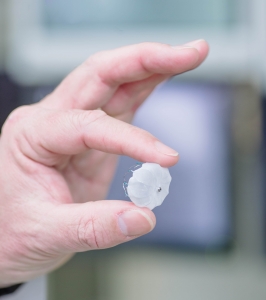Patients who suffer from non-valvular atrial fibrillation (AF) may soon find hope in the St. Jude Medical Amulet device, a new tool* designed to prevent the risk of stroke.
Board-certified Electrophysiologist Neal G. Kavesh, MD, FACC, FHRS, and board-certified Interventional Cardiologist Douglas G. Ebersole, MD, are among the few specialists in Florida to implant the Amulet device. Their first two procedures were recently performed in the Heart Center at Lakeland Regional Health.
“Atrial fibrillation is a condition characterized by an irregular heartbeat, and it currently afflicts millions of Americans,” says Dr. Kavesh. “Patients who suffer from AF are more likely to incur a blood clot in the area of their heart known as the left atrial appendage, which could in turn lead to a debilitating stroke.”
“Blood thinners can be effective for most people with atrial fibrillation to lower their risk of stroke,” explains Dr. Ebersole. “In many others, however, these medications result in too many adverse side effects such as excessive bleeding. A device like the Amulet can potentially eliminate the need for long term blood thinners among these patients.”
During the procedure, the cardiologist guides the device through a catheter to the opening of the left atrial appendage. Once implanted, the Amulet device effectively eliminates the risk of clot formation by closing off that opening.
The device implantation and outcomes are currently being reviewed as part of a clinical trial sponsored by St. Jude Medical. In partnering together, the Watson Clinic Center for Research, Watson Clinic LLP and Lakeland Regional Health are among the first medical establishments in the country to take part in the trial.
The Amulet device is intended to serve a specific, yet pivotal segment of the patient population. Qualified candidates include those who suffer from non-valvular atrial fibrillation, a particular type of AF that does not result from a valve disease such as mitral stenosis or a mechanical replacement heart valve. Participants must also have a significant reason they are not able to tolerate long term treatment with blood thinning medication.

For nearly two years, cardiologists have utilized the FDA-approved Boston Scientific Watchman® device in the treatment of these patients. Participants in the new randomized clinical trial may receive either the Watchman® or the new Amulet device during their procedure while those who do not wish to take part in the trial can still receive the Watchman®.
“This trial gives us an opportunity to play a role in the evolution of cardiac care,” Dr. Kavesh says. “It also echoes our commitment to providing patients with the safest, most effective and most advanced options available.”
Lakeland Regional Health’s Heart Center offers the most established cardiac care program in Polk County. As first in the region to perform many life-saving cardiac procedures, the Heart Center’s more than 25 years of experience is unmatched locally. Lakeland Regional Health was first in the area to offer such leading advances in treatments as transfemoral aortic valve replacements, atherectomy and stenting. Three Centers of Excellence – the Heart Rhythm Center, Interventional Cardiology Center and Cardiothoracic Surgery Center, optimize care for patients.
“We are excited that Lakeland Regional Health Medical Center is able to offer the most clinically advanced treatments in the world,” said Timothy J. Regan, MD, Medical Center President and Chief Medical Officer at Lakeland Regional Health. “The Heart Center physicians and team members are passionate in their commitment to deliver the best outcomes and safest care to our patients and their families.”
To learn more, ask your physician about the Amulet and Watchman® devices.
*St. Jude Medical Amulet is an investigational device not approved by the Food and Drug Administration.
